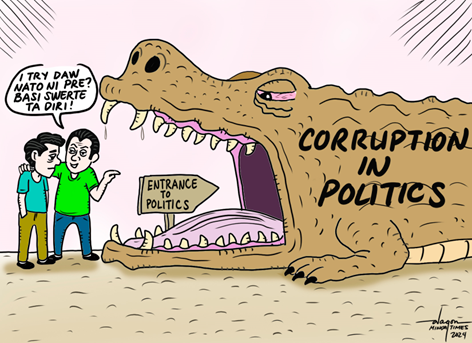The Philippines is a complex country composed of 120 spoken languages, 42 004 Barangay (local governments), 7 641 islands, 18 regions, 182 ethnolinguistic groups and with every religion represented. Several Islamic terrorist groups still operate in the south of the country and poverty and corruption are endemic.
Credit management in the Philippines is not for the faint hearted!
The Philippines is one of the most corrupt countries in the world and money laundering is a huge problem. The Philippines is ruled by elite families who have held power since independence. This oligarchy is ruthless and will eliminate anyone who stands in their way; assassinations have occurred in the past. This corruption ensures the Philippines remains a developing country.
These oligarchs have become incredibly wealthy after pillaging the country since independence in 1946. They have literally amassed fortunes in the billions which they need to get out the country. Many of these oligarchs use bank accounts in the UK or Switzerland.
But this has created a problem for the oligarchs, how do they get their money out of the country?

The Philippines does have banking laws, and the banks do monitor the transfer of funds out of the country. If someone transfers over a certain limit, the banks will ask the reason for the transfer and will not allow large transfers out of the country without the documents to justify the transfer.
To tackle this issue, they have developed a very simple technique which we have come across often. Someone travels overseas and signs contracts for services or products with overseas companies. These contracts require an initial payment and usually no service or product is provided until this initial payment is made. This initial deposit, bond or payment is normally in the hundreds of thousands or millions of US dollars. The Filipinos then return to the Philippines and present these documents to the Philippines bank so the money will be allowed to leave the country.
There is a big flaw in the system, these overseas payments do not have to go directly to the creditor on the contract but can go to any overseas bank account. So, the Filipinos simply transfer the money to their own bank account and then their objective is achieved, they have managed to get their money out of the Philippines. Very simple, and they even go on a holiday to sign the contracts!
We have dealt with many such cases; the highest amount we have seen so far is USD $33,000,000 in a single payment.

In another case the Filipinos agreed to build plants in Slovakia and even had a letter of support from the Slovakian government. I wonder what the Slovakian government thought when no plants were ever built!
It is a very simple but effective way of getting money out of a country. The issue for creditors is do they initiate legal action and spend tens of thousands of dollars when they have (in reality) not lost anything? Yes, they did lose the value of the contract, but no services or products were supplied to the debtors, the money had to be paid before anything was provided.
The truth is no creditor will ever pursue the amount beyond amicable collections and will simply tear up the contract in preference to spending years in court. The debtors never had any intention of paying the contract, the creditors were simply pawns to help the perpetrators get money out of the country.
This is a common issue, which is very difficult to prevent. The creditor could ask for a payment up front before any contract is signed, but this is not normal practice. The creditor can also ask for recommendations from other international (non-Filipino) companies, but again this is unusual.
When signing a lucrative contract, creditors do not realize they are being used by criminals to perpetrate a crime. As the saying goes “if it is too good to be true, it probably is”.

